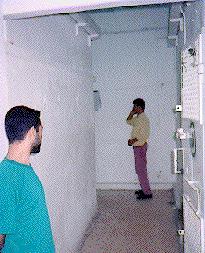
Above: Birzeit student Mustapha Atari,
in full possession of a wry sense of humour,
but whose illness worsened during his detention.

Left: Evening prayer call in the Muqata'a.
Protesting their detention and initially harsh restrictions on visits and freedom of movement between cells in the prison complex, the Ramallah prisoners held a hunger strike from 9-21 April, stopping only after members of the Palestinian Legislative Council pointed out that the Israeli bombing of Lebanon was increasingly eclipsing their story. "We are ashamed to be standing in front of you in this place, talking about these issues," said the Council members, who have repeatedly raised the issue in Council meetings. When the prisoners began ingesting milk, six days into their hunger strike, they discovered that the Muqata'a authorities were watering it down.
During this period, Palestinian newspapers showed a reluctance to cover their story even briefly, if at all, with only Al-Bilad (circulation 2,000 approx.) breaking the news of the hunger strike after the first few days, Al-Ayam (circulation 5,000 approx.) after the eighth day, and An-Nahar (circulation 4,000 approx.) after the strike had finished.
The papers with a smaller circulation are not scrutinised as closely. From Al-Quds (circulation 25,000 approx.) there was absolute silence. When the prisoners phoned the newspapers to see if they would print an open letter, all refused. They reported being told by staff at the Al-Quds office, "We can't print it because of the Mukhabarat ("Intellegence")."
In a phone conversation with Adnan Abdul Latif, Executive Editor of Al-Quds newspaper, there was a very uneasy silence on the end of the telephone line for 20 seconds when I asked him why the newspaper had published nothing about the hunger strikers. Irritated, he eventually asserted that, "We did print something about it." If that was the case, I asked him, exactly when was it printed? "Go and check your archives," he snapped and terminated our phone call. Unfortunately, it is clear that the media in Palestine is scared to report human rights violations if they are committed by the Palestinian Authority.
